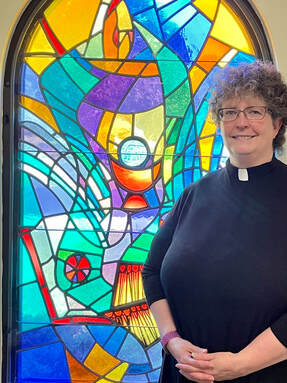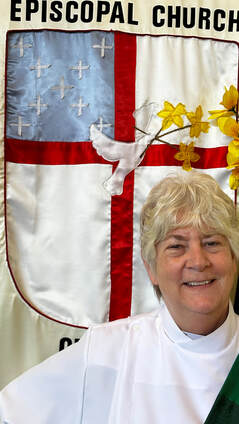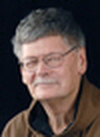The Rev. Amy Cornell, Rector

The Reverend Cornell comes to Saint David’s from Grace-Saint Paul’s Episcopal Church in Mercerville where she has faithfully served as Priest in Charge/Rector since 2012. She is a cradle Episcopalian and lifelong member of the Diocese of New Jersey. In addition to managing the day to day operations of the parish, Mother Cornell has been active in a variety of Diocesan initiatives, serving as a discipleship coach for over five years and currently serving on the Diocesan Council, Liturgy and Music Commission, and the Discerning our Common Call Committee. Prior to assuming her position at Grace-Saint Paul’s, she served as Deacon of Saint Francis Church in Dunellen in 2012.
Reverend Cornell attended the General Theological Seminary in New York, starting in 2009, receiving a Master of Divinity degree in 2012. During that time she also served as a Seminarian at Saint Mark’s Episcopal Church in Plainfield New Jersey and later at Trinity Episcopal Church in Asbury Park. She holds a Bachelor of Arts in Communications from Douglass College in New Brunswick. Her experience in digital communications has allowed her to effectively engage parishioners throughout the unique challenges posed by the pandemic.
She also has a lifelong love of music and looks forward to further amplifying that ministry at Saint David’s. Prior to her ministerial pursuits, Reverend Cornell also held managerial positions at Barnes and Noble Bookstores, and Holiday Inn.
Reverend Cornell attended the General Theological Seminary in New York, starting in 2009, receiving a Master of Divinity degree in 2012. During that time she also served as a Seminarian at Saint Mark’s Episcopal Church in Plainfield New Jersey and later at Trinity Episcopal Church in Asbury Park. She holds a Bachelor of Arts in Communications from Douglass College in New Brunswick. Her experience in digital communications has allowed her to effectively engage parishioners throughout the unique challenges posed by the pandemic.
She also has a lifelong love of music and looks forward to further amplifying that ministry at Saint David’s. Prior to her ministerial pursuits, Reverend Cornell also held managerial positions at Barnes and Noble Bookstores, and Holiday Inn.
Deacon Carol Patterson

The Reverend Carol Patterson serves as St. David’s deacon. She was a student in the first class of the Diocese’s ‘School of Ministry’. The Right Reverend William Hallock Stokes, D.D. Twelfth Bishop of New Jersey ordained her to the Sacred Order of Deacons on August 21, 2021.
Prior to her ordination as a Deacon, Carol has been a faithful member of St. David’s for over 40 years. Over those years, she served the church in many capacities including; Vestry at large, Senior Warden, Jr. Warden, Choir member, Lector, Eucharistic Minister and Sunday School teacher. She holds a Bachelor of Liberal Arts and a Master’s Degree in the Science of Management (MSM) from Thomas Edison State University. She also is a Registered Nurse with over 20 years of clinical experience.
Serving God and His people inside and outside the church walls is a calling that she is excited to pursue. Serving on the altar, outreach activities, home visits, including nursing homes and interacting with the Sunday School children are all blessings that nourish her soul.
Brother John Baptist, OSF

Brother John Baptist serves St. David’s in areas of pastoral care and spiritual leadership, and is on call at times of pastoral emergencies. He began his service to St. David’s in 1997.
Serving God in the area of chaplaincy is a very important part of Brother John’s ministry; he serves on the Princeton Hospital Committee on Religious Ministry and as Chaplain to 480 souls at Enable (an agency devoted to serving our developmentally disabled sisters and brothers). Brother also serves as Hospice Chaplain with the Visiting Nurses Association of Mercer County.
Brother John belongs to a worldwide Franciscan community within the Anglican Communion. His traditional garb of a brown and black habit symbolizes the Franciscan vows of simplicity, fidelity, purity and obedience.
When asked, Brother John explained his decision to pursue life as a religious in an Anglican branch of God’s One Holy Catholic and Apostolic Church. A testing process that began in 1999 culminated on September 30, 2006 when he made his perpetual vows before God and his Franciscan Community. At the offertory part of the Mass, his Rule for Life was placed on the altar, offered up to God, the Rule a binding covenant from which only the bishop can dispense him. Brother John reflects on the “Rule for Life,” quoted here in part:
“A rule of life is simply a structure in which spiritual formation is facilitated. The Latin term is regula, which does not have some of the negative connotations of the English word rule…Religious orders and groups commonly have a rule that must be adhered to for membership. A personal rule is entirely your own. Many people already have a personal rule and don’t even know it. Coming to church on Sundays and holy days is a rule. Daily prayer is a rule. Saying grace at meals is a rule. A rule is simply a way of bringing God into your life in a regular way.”
Brother John served as Diocesan Spiritual Director for the Cursillo community within the Diocese of New Jersey. Cursillo is a movement within the Episcopal and Roman Catholic churches that helps individuals renew the faith they received in Holy Baptism and Confirmation. Please speak to Brother John if you have any questions regarding Cursillo.
Serving God in the area of chaplaincy is a very important part of Brother John’s ministry; he serves on the Princeton Hospital Committee on Religious Ministry and as Chaplain to 480 souls at Enable (an agency devoted to serving our developmentally disabled sisters and brothers). Brother also serves as Hospice Chaplain with the Visiting Nurses Association of Mercer County.
Brother John belongs to a worldwide Franciscan community within the Anglican Communion. His traditional garb of a brown and black habit symbolizes the Franciscan vows of simplicity, fidelity, purity and obedience.
When asked, Brother John explained his decision to pursue life as a religious in an Anglican branch of God’s One Holy Catholic and Apostolic Church. A testing process that began in 1999 culminated on September 30, 2006 when he made his perpetual vows before God and his Franciscan Community. At the offertory part of the Mass, his Rule for Life was placed on the altar, offered up to God, the Rule a binding covenant from which only the bishop can dispense him. Brother John reflects on the “Rule for Life,” quoted here in part:
“A rule of life is simply a structure in which spiritual formation is facilitated. The Latin term is regula, which does not have some of the negative connotations of the English word rule…Religious orders and groups commonly have a rule that must be adhered to for membership. A personal rule is entirely your own. Many people already have a personal rule and don’t even know it. Coming to church on Sundays and holy days is a rule. Daily prayer is a rule. Saying grace at meals is a rule. A rule is simply a way of bringing God into your life in a regular way.”
Brother John served as Diocesan Spiritual Director for the Cursillo community within the Diocese of New Jersey. Cursillo is a movement within the Episcopal and Roman Catholic churches that helps individuals renew the faith they received in Holy Baptism and Confirmation. Please speak to Brother John if you have any questions regarding Cursillo.
